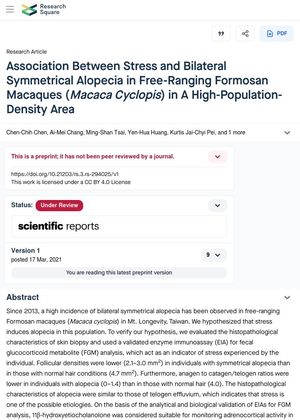Association Between Stress and Bilateral Symmetrical Alopecia in Free-Ranging Formosan Macaques in a High-Population-Density Area
March 2021
in “
Research Square (Research Square)
”
bilateral symmetrical alopecia stress enzyme immunoassay fecal glucocorticoid metabolite follicular densities anagen catagen telogen telogen effluvium 11β-hydroxyetiocholanolone adrenocortical activity symmetrical hair loss EIA FGM hair follicle density hair growth phase hair resting phase hair shedding phase stress-induced hair loss glucocorticoid metabolite adrenal activity

TLDR Stress likely causes hair loss in Formosan macaques.
In 2021, a study was conducted on free-ranging Formosan macaques (Macaca cyclopis) in Mt. Longevity, Taiwan, to investigate the high incidence of bilateral symmetrical alopecia observed since 2013. The researchers hypothesized that stress was causing the hair loss. They used a validated enzyme immunoassay (EIA) for fecal glucocorticoid metabolite (FGM) analysis, an indicator of stress, and found that follicular densities were lower and anagen to catagen/telogen ratios were lower in individuals with alopecia. The histopathological characteristics of the alopecia were similar to those of telogen effluvium, a condition often triggered by stress. The mean concentrations of 11β-hydroxyetiocholanolone, a suitable indicator of adrenocortical activity, were higher in individuals with alopecia (2.02 μg/g, n = 10) than in those without (1.41 μg/g, n = 31), and were positively associated with alopecia. The study concluded that stress was likely the trigger for symmetrical alopecia in these macaques, potentially increasing zoonosis risk due to frequent human-macaque contact.




